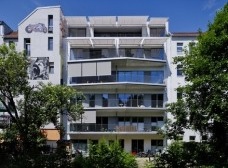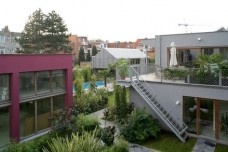
newspaper
agenda cultural
Architects talk: Roedig . Schop Architekten & B-Architekten
Collective Private Commissioning (Collectief Particulier Opdrachtgeverschap, or CPO) may have been struggling to get off the ground in the Netherlands, but similar initiatives in neighbouring countries are making rapid strides. The focus of the Architects Talk on Thursday, 3 February 2011, is German and Flemish examples of projects that involve small collectives realising their own homes, often without using a developer as an intermediary. The architects Christoph Roedig and Ulrich Schop of Berlin-based Roedig . Schop Architekten will be presenting several projects that they have realised for so-called Baugruppen, while Sven Grooten of the Antwerp-based bureau B-Architecten will present some inspiring examples of developments driven by self-build collectives that they have realised in Belgium. Besides providing an introduction, Vincent Kompier will chair a discussion with these designers.
Building together
While the purely quantitative demand for housing seems to be levelling off, the demand for high-quality living and working spaces remains undiminished and in the near future will to some extent start to be dominated by a growing demand for living with like-minded people and people’s desire to develop projects themselves. Together these trends are leading to a new development that involves home-makers organising themselves into collectives and jointly acquiring a plot of land, employing an architect and then, without adopting a developer as an intermediary, developing a residential complex that meets their personal housing specifications.
German and Flemish examples
Despite many initiatives to stimulate Collective Private Commissioning in the Netherlands, the developments in this field continue to trail behind those in neighbouring countries. In Germany and Belgium the trend of collective self-build development, which results in the whole amounting to more than the sum of the parts, has already made significant headway and has produced some outstanding results. The architects Christoph Roedig and Ulrich Schop of the Berlin-based practice Roedig . Schop Architekten and Sven Grooten of the Antwerp-based B-Architecten bureau will be presenting several examples and addressing related questions: What is the architect’s role in such processes? Should the architect remain in the background and adopt a patient and sympathetic stance or, when working for a group, is there actually an obligation to prevent the architecture becoming the poor relation of the group dynamic?
Social cohesion
It turns out that in practice these kinds of collective housing projects lead to greater social cohesion. The interests of the residents extend beyond their own front door. This raises a question about the extent to which collective residential development can lead to a new form of citizenship and a new community spirit. What are the consequences of this for the architecture of the collectively built projects? Does this lead to private enclaves and islands within the city or do these projects in fact provide an impulse to socially and economically disadvantaged neighbourhoods?
This duo lecture is organised in cooperation with the Friends of the NAI.
When & Where
Thursday February 3, 2011
Start: 8.00 pm. Doors open: 7.30 pm
Language: English
Location: de Dépendance, Schiekade 189 Rotterdam
Entrance Fee: €5. Students: €3. Free for Friends of the NAI
Please keep in mind: tickets can only be payed in cash.
Register: www.nai.nl/register

roedig . schop architekten: K20 in Berlin Friedrichshain
photo roedig-schop

B-Architecten: D-Factory in Deurne
photo B-Architecten

